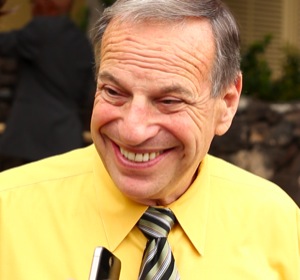
When Mayor Bob Filner finds himself up against a wall politically, he turns to the very source of his political power: his constituents. That political power supply, the mayor says, is also his best source of personal vigor.
As one of the mayor’s senior staff members told San Diego LGBT Weekly during a recent day of exclusive, unlimited access “it takes a lot of energy just to keep up with him.”
According to that member of the mayor’s team, multiple staffers working in shifts is what’s needed to ensure Bob Filner has more than just a security detail accompanying him to the myriad of events he attends in a single day.
Indeed, trailing Bob Filner as a reporter is challenging. Consider just one hour-and-a-half slice of our time with San Diego’s top government official.
In a mere 90-minute period, we found ourselves struggling to keep up with the mayor’s SUV, racing from the outermost edges of Balboa Park, across town to the Handlery Hotel in Mission Valley, then north to the farthest reaches of the 163 freeway to arrive at the Chinese School in Kearney Mesa.
There, along with San Diego County Supervisor Ron Roberts and celebrated physicist, Prof. Stephen Hawking, Filner helped dedicate the planting of a peach tree in honor of the late San Diego philanthropist (and friend of Dr. Hawking), Dennis Avery.
Earlier, at the Veteran’s War Memorial Museum in Balboa Park, Filner gave a speech to a gathering of vets, many of whom were decked out in uniforms from just about every American wartime period – from the Civil War, to Operation Iraqi Freedom. There, his honor presented an official proclamation welcoming home soldiers, Marines, sailors and airmen from Vietnam.
“This is long overdue,” Filner told the crowd, adding that they deserved much more than a plaque. He promised to provide more city services to homeless veterans.
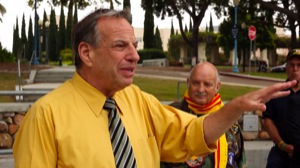
“The people are his secret weapon; he thrives on interaction with them,” the aforementioned staff member said. “And as you can see, they gravitate to him.”
Indeed, anyone who spends a day with this mayor can see that Bob Filner enjoys a uniquely understated brand of rapport with most “regular folks,” as the expression goes. Was that ease with voters, residents, families, youths and other constituents always part of this mayor’s personality? In a word, he says, “Yes.”
“Maybe it sounds corny to say it,” Filner explains. “But, they’re why I got into politics, into governing, to begin with. It’s that simple; I love the people of this country and this city.”
For the most part, Filner laments, the media seem to miss the story of his “connectedness” to the people he represents.
“Sometimes I don’t think they see past the personalities and hype surrounding only the most sensational issues,” Filner said. “The problem with that is not only does the fact that I get along with most people very nicely – I mean real people, like these San Diegans you see here (at a park in City Heights) – not only does that fact get missed, but the most important aspect of the issues we face in our city get missed.”
According to Filner, the most important aspect of any issue involving governance is how everyday people are affected by public policy decisions.
“Yet somehow, multinational corporations who own hotels in San Diego have the undistracted ear of those in power and in the media,” said Filner, who at the time of our interview had just taken a minor beating in the Tourism Management District (TMD) special assessment battle.
Indeed, seemingly lost amid the din of disdain for the mayor’s reticence to help hoteliers pay for their advertising and marketing, was the fact that every indication was that Filner had vast support from voters regarding his stance on TMD.
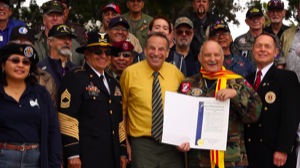
“Of course, that was underreported,” he said. “I don’t know what the exact poll numbers were – if they were scientific polls – but no one can argue that voters didn’t support my decision to take a second look at this notion that government should help corporations pay for their marketing.”
The mayor’s refrain of incredulity toward TMD’s loudest went something like this: These guys usually say government can’t do anything right. Why now do they need us to be involved with their advertising campaigns?
In the end, however, Mayor Filner signed the TMD contract – albeit, with one caveat: Should the City be sued by citizens groups for footing the bill for private companies’ marketing plans; those companies – not the taxpayers – would be responsible for settlement payments or court-ordered damage awards.
By backing away from a full-fledged war with San Diego’s big hotels and all but one City councilmember, Mayor Filner probably preserved a great deal of political capital.
He may need that capital if he takes on some in the City who are dubious about the mayor’s plans for more housing for homeless veterans.
A former congressman and chair of the House Veterans Affairs Committee, Mayor Filner has called veterans the most underappreciated members of society. Historically even lower on the totem pole of appreciation for their sacrifices and service, according to Filner, have been LGBT veterans.
“These men and women have gone to war,” Filner said. “They’ve risked their lives for your freedom and mine; they’ve asked for nothing in return except that we treat them with respect and decency.
“Of course, they want and I believe have earned, the basic services they were promised when they enlisted – services like good health care, a chance to work, decent, affordable housing and the educational opportunities they’ve earned.”
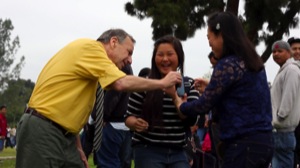
As a congressman, Filner was a supporter of repealing Don’t Ask, Don’t Tell, the now defunct Dept. of Defense policy that, until 2011, denied lesbian, gay and bisexual servicemembers the right to serve openly in the military. Filner now wants all servicemembers, including all LGBTs to be allowed to serve openly (transgender members are stilled barred).
Filner says he also wants equal benefits for LGBT servicemembers and their families.
“They’re not getting that now,” he said. “That’s not what America is about. That’s not what we’re sending gays and other LGBT soldiers abroad to fight for. Why shouldn’t they have the same rights and benefits for their families as straight soldiers, sailors and Air Force members? I think they should.”
Filner spent two months behind bars in Mississippi as a prisoner for protesting in favor of equal voting rights and civil rights protections for African Americans when he was 19, as one of the legendary Freedom Riders.
With a civil rights pedigree such as his, it’s comes as no surprise that Filner considers the worst mistake of his professional career to have been his vote, as a member of the U.S. House of Representatives, in favor of the 1996 Defense of Marriage Act (DOMA).
“I wish I could undo it,” Filner told LGBT Weekly. “It was wrong, and I regretted it almost instantly.”
Our day with the mayor ended at a Cambodian New Year festival at a park in City Heights. There, the mayor was at home with a vastly diverse and quintessentially San Diegan mass of constituents.
There, he mingled contentedly with Pacific Islander Americans, Asian Americans, Latino Americans, African Americans, LGBTs and their families, as well as opposite-sex couples and traditional families – and even folks of European descent.
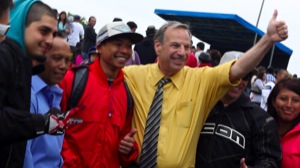
Circa 1993 President Bill Clinton – known for his kinship with the African American community – was introduced as “America’s first black president” to roaring applause from a mostly black crowd.
Allegorically, Mayor Filner was introduced at the 2013 Cambodian New Year celebration as “San Diego’s first Asian mayor.”
In fact, Bob Filner has earned affinity and loyalty from a wide swath of several minority communities. If this mayor holds true to his vow never to let the LGBT community down again in our fight for equality, he might one day be introduced as California’s first (honorary) gay governor.











